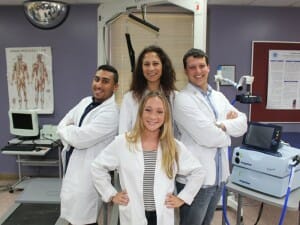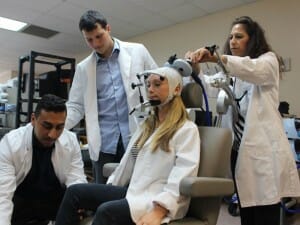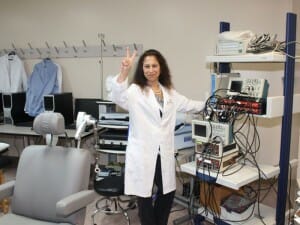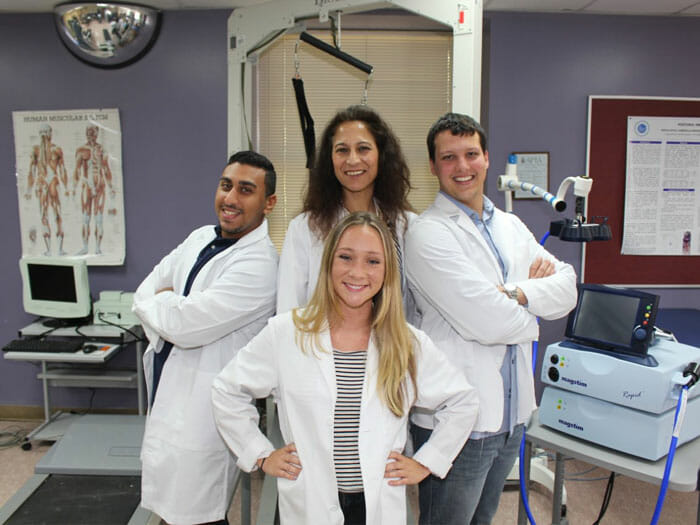
Dr. Knikou (top-center) and her DPT students work collaboratively towards a better understanding of human movement in health and disease.
Dr. Maria Knikou was recently awarded a $400,000 grant by the Craig H. Neilsen Foundation to develop strategies in treating people who suffer from serious spinal cord injuries, and bringing sensation and mobility back into their lives.
“People with spinal cord injuries have motor dysfunction that results in substantial social, personal, and economic costs,” said Dr. Knikou, a neurophysiologist and Professor of the Clinical Doctorate in Physical Therapy (DPT) program with the School of Health Sciences, explaining the impetus for her research. “This uncontrolled muscle spasticity and motor dysfunction can result in disabilities that significantly reduce quality of life.”
This grant will enable Dr. Knikou and her researchers to develop a stimulation protocol in order to, Dr. Knikou explains, “induce functional recovery” in people who are attempting to recover from moderate to serious spinal injury.

Research in action: non invasive transcranial magnetic stimulation assesses connections between the brain and leg muscles.
Dr. Knikou’s research on spinal cord injuries focuses on utilizing non-invasive trans-spinal stimulation of the spinal cord with constant or direct electrical current to strengthen the connections between the brain and spinal cord, thereby improving movement.
The two-year grant was awarded for Dr. Knikou’s project, titled, “Trans-spinal Stimulation to Increase Neuroplasticity and Recovery after SCI,” which seeks to test a new intervention to treat motor dysfunction of people suffering from spinal cord injuries.
Her lab uses Trans-Spinal Constant or Direct-Current Stimulation to alter the signals between the nerves and muscles in people suffering from spasticity due to injuries. According to Dr. Knikou, this spasticity causes stiffness of the muscles affected by the nerve damage caused by spinal injuries. This stiffness can cause patients suffering from these injuries to have difficulty moving and going about their daily lives. Dr. Knikou’s project aims to not only treat subjects who are undergoing the clinical trials but also to research more effective strategies in order to provide long-term treatment.
The treatments are non-invasive and require the subjects to receive 40-minute non-invasive Trans-Spinal Stimulations daily for three weeks. One of the machines used is called Trans-Cranial Magnetic Stimulation (TMS), which both acts as treatment for the subjects during the clinical trials as well as helps the researchers study the action potential of the stimulation being provided.

Dr. Knikou celebrates victory on understanding the function of the human nervous system via non-invasive electrophysiological methods.
Dr. Knikou elaborated on the methodology that her lab uses, saying “People with motor incomplete spinal cord injury will be randomized to receive trans-spinal stimulation with direct or constant current.” The researchers, many of whom are post-graduates working on their DPT degrees as well as CSI postdoctoral research fellows, also use an EEG machine to map the areas of the brain that are being stimulated in order to better understand which placement and intensity of the electrodes works best with each subject. “Results from the proposed project will provide for the first time evidence on a novel neuromodulation method that has the advantages of being noninvasive, cost-effective, and can be used in different clinical settings to improve motor function and decrease spasticity after spinal cord injury in humans,” Dr. Knikou concluded.
While the overall goal of these clinical trials is to provide relief to people currently suffering, it will also build novel and effective rehabilitation strategies.
Dr. Knikou remains passionate about training the next wave of physical therapy researchers, and she demonstrates this by tasking her lab’s doctoral and undergraduate students with assisting with the clinical trials in a very hands-on manner.
Speaking of her philosophy behind her delegation of her student’s responsibilities, Dr. Knikou says. “I want them to not only be consumers but also creators of research.”
For more information about the Trans-Spinal Stimulation clinical trials, visit www.csi.cuny.edu/schoolofhealthsciences.
















